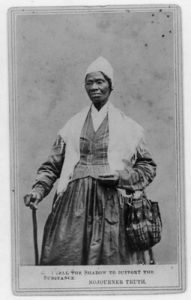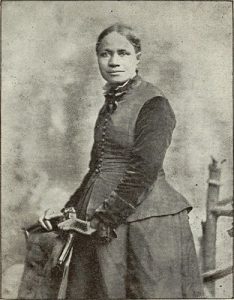LPF Forgotten Heroine Series
Alice McCain, August 7, 2020


<Sojourner Truth
Frances Ellen Watkins Harper (c1893)>
Sojourner Truth. Frances Ellen Watkins Harper. Mary Ann Shadd Cary. Harriet Forten Purvis. Sarah Parker Remond. Fannie Barrier Williams. Coralie Franklin Cook. Anna Julia Cooper. Angelina Weld Grimké. Lucy Diggs Slowe. Mary Church Terrell. Nannie Helen Burroughs. Ida Wells-Barnett. Harriet Tubman. Nellie Quander. Adella Hunt Logan.
Have you heard of these Black women leaders in the cause for women’s suffrage?
Would it surprise you to learn that at the historic Seneca Falls Convention in July, 1848, because of racism, there were likely no Black women? And yet Black women were among the first to fight for universal suffrage—voting rights without regard to race, gender, education, or economic status. Sadly, these “forgotten heroines” didn’t always benefit from the amendment’s passage, after decades of struggle, on August 18, 1920.
“The first convention to consider women’s rights as an issue was the May 9, 1837, Anti-Slavery Convention of American Women in New York City. Several African American women attended this convention.” (1)
After Seneca Falls a series of women’s conventions was held in different parts of the country. At a meeting of the American Equal Rights Association in 1851, former slave Sojourner Truth (1789-1883), spoke up for women such as herself. Her speech, “Ain’t I a woman?” powerfully detailed the hard life she had lived and rights that she had been denied because of the color of her skin as well as her gender. (2)
Frances Ellen Watkins Harper (1825-1911) was a Black feminist, author, founder of the National Association of Colored Women, and participant in the 1866 Woman’s Rights Convention. Harper addressed unequal treatment of Black Americans, both men and women, and America’s unwillingness to support a constitutional amendment that would enfranchise Black men and criminalize lynching. “She emphasized that Black women were facing the double burden of racism and sexism at the same time, therefore the fight for women’s suffrage must include suffrage for African Americans… Harper, along with Frederick Douglass and many others supported the amendment and helped to form the American Woman Suffrage Association.” (3)
“Black suffragists organized within the National Association of Colored Women (NACW); religious organizations such as the Woman’s Convention of the National Baptist Convention; and local women’s clubs and suffrage leagues.” (1)
The Library of Congress and the Women’s History Project are goldmines of information about women of color who overcame huge odds to gain rights for themselves and others. I invite you to dig into these and other resources, some listed below, and be greatly enriched.
2. Zinn, Howard. (1995). A People’s History of the United States 1492-present. New York, N.Y.: HarperPerennial. P. 122.
3. https://www.womenshistory.org/education-resources/biographies/frances-ellen-watkins-harper
MORE:
4. https://www.nytimes.com/interactive/2020/08/07/us/suffragists-descendants.html
6. https://www.ourdocuments.gov/doc.php?flash=false&doc=63
7. https://www.archives.gov/education/lessons/woman-suffrage
8. https://www.history.com/topics/womens-rights/seneca-falls-convention
